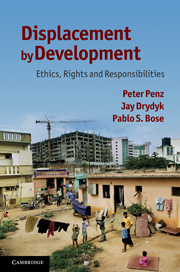Book contents
2 - Problems of polarization
Published online by Cambridge University Press: 05 June 2012
Summary
Two decades of contention over displacement effects of development have provided sufficient time for solid lines of opposition to emerge. ‘Solid lines’ may be an understatement, and it may not be much of an overstatement to say that the two main camps have evolved paradigms of thought, analysis and evaluation that have become incapable of engaging with each other. The ‘reformist-managerial’ camp and the ‘movementist’ camp – to use Dwivedi's apt distinction – interacted for a brief moment within the World Commission on Dams (WCD). This interaction seems to have been short-lived, possibly because governments and the World Bank have backed away from the WCD recommendations, and the movementists had doubts about their effectiveness, anyway. (See Chapter 5.)
Our initial goal in this chapter will be to see whether this policy polarization is reinforced by polarized conceptions of development. Our ultimate goal is to see whether development ethics could play a role in breaking the impasse. We begin by sketching the prevailing policy divide as we see it, embellishing somewhat on Dwivedi's distinction. We then identify a very deep and persistent axis of polarization between conceptions (or theories) of development. At one end of the spectrum, development is conceptualized as a process following its own rules, that spreads ineluctably within and among societies. Let us call this ‘development as invasive’. At the other end, development is conceived as an outcome of deliberate intervention that depends vitally on the political will to bring it about.
- Type
- Chapter
- Information
- Displacement by DevelopmentEthics, Rights and Responsibilities, pp. 17 - 40Publisher: Cambridge University PressPrint publication year: 2011

